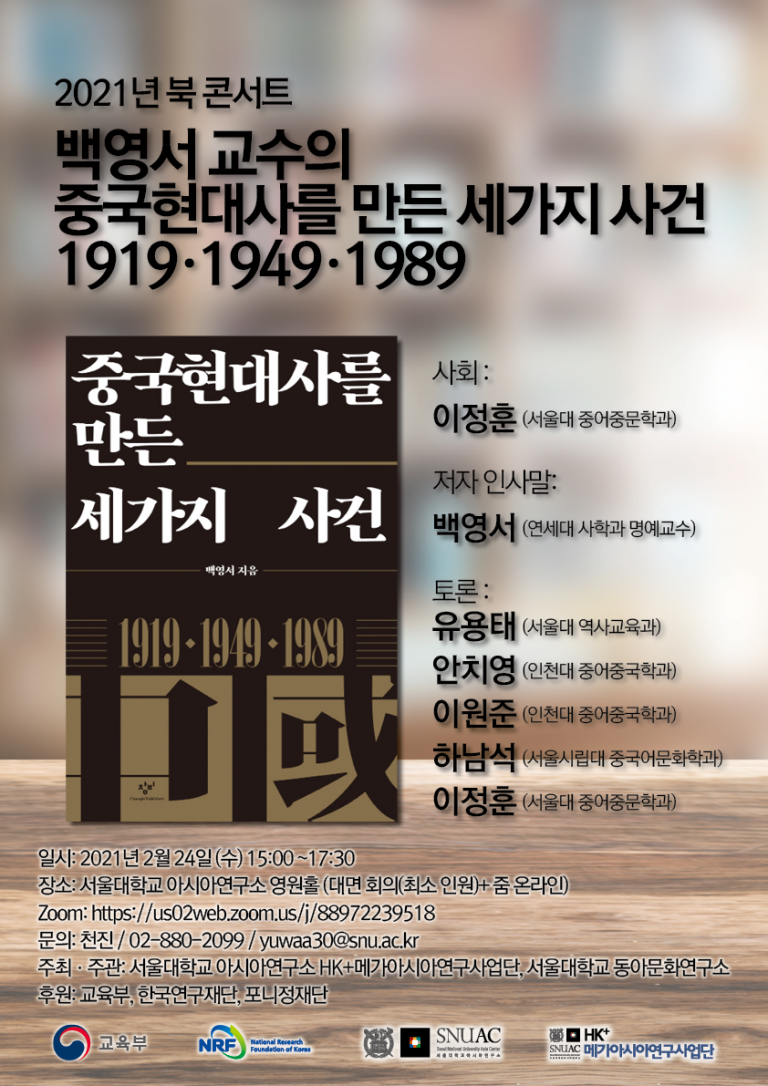[Book Concert] Prof. Young Seo Baik’s ‘Three Events that Shaped the History of Modern China: 1919 · 1949 · 1989’
- Date: February 24th, Wednesday, 2021 15:00 – 17:30
- Location: Youngone Hall (2F), SNUAC (Bldg. 101) & Online via Zoom
Author Bio
Prof. Young Seo Baik graduated and received his Ph.D. from the Dept. of Asian History at SNU. He has served as the Dean of College of Liberal Arts at Yonsei University, director of Institute of Korean Studies, executive editor at Changjak gwa Bipyeong (Creation and Criticism), and the president of the Korea Academic Association of Contemporary Chinese Studies and the Korean Association for Studies of Modern Chinese History, currently is a professor emeritus at the Department of History, Yonsei University, as well as the chairman of Segyo Institute. His publications are single-authored monographs The Way of Social Humanities, Questioning East Asia Again at Key Sites, The Return of East Asia, A Study on Contemporary University Culture of China,『思想東亞: 韓半島視角的歷史與實踐』, 『橫觀東亞: 從核心現場重思東亞歷史』, and『共生への道と核心現場: 實踐課題としての東アジア』; co-authored and co-edited books including The Regional Order of East Asia, For Those Who Think and Resist: Selected Essays of Lee Young-hee, The Reform of 100 Years, History of Korea-China Relations for Tomorrow, and An Eye for Seeing Taiwan; translated works including Ten Events that Made East Asia, and Okinawa, the Site of Structural Discrimination and Resistance.
Hosted by SNUAC HK+ Mega-Asia Research Project Team, Center for East Asian Studies at SNU
Managed by the Center for East Asian Studies at SNU, SNUAC HK+ Mega-Asia Research Project Team
Sponsored by the Ministry of Education, National Research Foundation, Pony Chung Foundation
3:05-3:15 Greeting from the author: Young Seo Baik (Professor Emeritus, History, Yonsei University)
3:15-4:30 Discussion
Yongtae Yu (History Education, SNU)
Chiyoung Ahn (Chinese Language & Cultural Studies, Incheon National Univ.)
Wonjune Lee (Chinese Language & Cultural Studies, Incheon National Univ.)
Namsuk Ha (Chinese Culture & Language, Univ. of Seoul)
Jeong Hoon Lee (Chinese Language & Literature, SNU)
4:30-4:40 Break
4:40-5:30 A focused discussion with the author
Moderator: Jeong Hoon Lee (Chinese Language & Literature, SNU)

